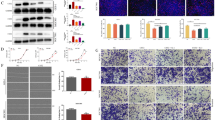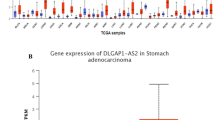Abstract
Never in mitosis gene A–related kinase 2 (NEK2) has been recognized as an oncogene involved in the initiation and progression of various human cancers. However, our knowledge is still lacking in regard to the function of NEK2 in gastric cancer, the most common cancer in Eastern Asia associated with poor prognosis. Therefore, in the present study, we investigated the association of NEK2 with gastric cancer. We found that the development of gastric cancer is associated with NEK2 overexpression, particularly in patients with large tumor size and lymph node metastasis. We also provided evidence that NEK2 overexpression binds to and inhibits protein phosphatase 1 (PP1), which subsequently activates AKT and the downstream oncogenic pathways. As a result, via AKT/HIF1α axis, the glucose metabolism is reprogrammed towards aerobic glycolysis to provide rapid energy for the growth of gastric cancer cells. Moreover, the autophagic activity is suppressed via AKT/mTOR axis, leading to impaired response to cancer treatment and enhanced cell survival. In contrast, inactivating AKT by NEK2 silencing decreases aerobic glycolysis and promotes autophagic cell death, which eventually inhibits the growth of gastric cancer cell. All these results revealed that NEK2 promotes gastric cancer progression via activating AKT-mediated signaling pathways, which expanded our knowledge on gastric cancer pathogenesis and also provided novel target for clinical treatment.





Similar content being viewed by others
Data availability
All data generated or analyzed during this study are included in this published article.
References
Andreasson U, Dictor M, Jerkeman M, Berglund M, Sundstrom C, Linderoth J, Rosenquist R, Borrebaeck CA, Ek S (2009) Identification of molecular targets associated with transformed diffuse large B cell lymphoma using highly purified tumor cells. Am J Hematol 84:803–808. https://doi.org/10.1002/ajh.21549
Bidkhori G, Narimani Z, Hosseini Ashtiani S, Moeini A, Nowzari-Dalini A, Masoudi-Nejad A (2013) Reconstruction of an integrated genome-scale co-expression network reveals key modules involved in lung adenocarcinoma. PLoS One 8:e67552. https://doi.org/10.1371/journal.pone.0067552
Bray F, Ferlay J, Soerjomataram I, Siegel RL, Torre LA, Jemal A (2018) Global cancer statistics 2018: GLOBOCAN estimates of incidence and mortality worldwide for 36 cancers in 185 countries. CA Cancer J Clin 68:394–424. https://doi.org/10.3322/caac.21492
Cervenka I, Valnohova J, Bernatik O, Harnos J, Radsetoulal M, Sedova K, Hanakova K, Potesil D, Sedlackova M, Salasova A, Steinhart Z, Angers S, Schulte G, Hampl A, Zdrahal Z, Bryja V (2016) Dishevelled is a NEK2 kinase substrate controlling dynamics of centrosomal linker proteins. Proc Natl Acad Sci U S A 113:9304–9309. https://doi.org/10.1073/pnas.1608783113
Cheng Y, Chen X, Ye L, Zhang Y, Liang J, Liu W, Zhou B, Zheng S, Huang Y, Chen G, Deng Y, Zhang Q, Yang Y (2018) The prognostic significance of NEK2 in hepatocellular carcinoma: evidence from a meta-analysis and retrospective cohort study. Cell Physiol Biochem 51:2746–2759. https://doi.org/10.1159/000495966
de Vos S, Hofmann WK, Grogan TM, Krug U, Schrage M, Miller TP, Braun JG, Wachsman W, Koeffler HP, Said JW (2003) Gene expression profile of serial samples of transformed B-cell lymphomas. Lab Investig 83:271–285. https://doi.org/10.1097/01.lab.0000053913.85892.e9
Dossou AS, Basu A (2019) The emerging roles of mTORC1 in macromanaging autophagy. Cancers (Basel) 11. https://doi.org/10.3390/cancers11101422
Fan WD, Chen T, Liu PJ (2019) NIMA related kinase 2 promotes gastric cancer cell proliferation via ERK/MAPK signaling. World J Gastroenterol 25:2898–2910. https://doi.org/10.3748/wjg.v25.i23.2898
Fang Y, Zhang X (2016) Targeting NEK2 as a promising therapeutic approach for cancer treatment. Cell Cycle 15:895–907. https://doi.org/10.1080/15384101.2016.1152430
Franqui-Machin R, Hao M, Bai H, Gu Z, Zhan X, Habelhah H, Jethava Y, Qiu L, Frech I, Tricot G, Zhan F (2018) Destabilizing NEK2 overcomes resistance to proteasome inhibition in multiple myeloma. J Clin Invest 128:2877–2893. https://doi.org/10.1172/JCI98765
Fry AM (2002) The Nek2 protein kinase: a novel regulator of centrosome structure. Oncogene 21:6184–6194. https://doi.org/10.1038/sj.onc.1205711
Harrison Pitner MK, Saavedra HI (2013) Cdk4 and nek2 signal binucleation and centrosome amplification in a her2+ breast cancer model. PLoS One 8:e65971. https://doi.org/10.1371/journal.pone.0065971
Huang D, Duan H, Huang H, Tong X, Han Y, Ru G, Qu L, Shou C, Zhao Z (2016) Cisplatin resistance in gastric cancer cells is associated with HER2 upregulation-induced epithelial-mesenchymal transition. Sci Rep 6:20502. https://doi.org/10.1038/srep20502
Kokuryo T, Yokoyama Y, Yamaguchi J, Tsunoda N, Ebata T, Nagino M (2019) NEK2 is an effective target for cancer therapy with potential to induce regression of multiple human malignancies. Anticancer Res 39:2251–2258. https://doi.org/10.21873/anticanres.13341
Lee J, Gollahon L (2013) Mitotic perturbations induced by Nek2 overexpression require interaction with TRF1 in breast cancer cells. Cell Cycle 12:3599–3614. https://doi.org/10.4161/cc.26589
Li Y, Chen L, Feng L, Zhu M, Shen Q, Fang Y, Liu X, Zhang X (2019) NEK2 promotes proliferation, migration and tumor growth of gastric cancer cells via regulating KDM5B/H3K4me3. Am J Cancer Res 9:2364–2378
Liu X, Gao Y, Lu Y, Zhang J, Li L, Yin F (2014) Upregulation of NEK2 is associated with drug resistance in ovarian cancer. Oncol Rep 31:745–754. https://doi.org/10.3892/or.2013.2910
Marina M, Saavedra HI (2014) Nek2 and Plk4: prognostic markers, drivers of breast tumorigenesis and drug resistance. Front Biosci (Landmark Ed) 19:352–365. https://doi.org/10.2741/4212
McCracken M, Olsen M, Chen MS Jr, Jemal A, Thun M, Cokkinides V, Deapen D, Ward E (2007) Cancer incidence, mortality, and associated risk factors among Asian Americans of Chinese, Filipino, Vietnamese, Korean, and Japanese ethnicities. CA Cancer J Clin 57:190–205. https://doi.org/10.3322/canjclin.57.4.190
Naro C, Barbagallo F, Chieffi P, Bourgeois CF, Paronetto MP, Sette C (2014) The centrosomal kinase NEK2 is a novel splicing factor kinase involved in cell survival. Nucleic Acids Res 42:3218–3227. https://doi.org/10.1093/nar/gkt1307
Neal CP, Fry AM, Moreman C, McGregor A, Garcea G, Berry DP, Manson MM (2014) Overexpression of the Nek2 kinase in colorectal cancer correlates with beta-catenin relocalization and shortened cancer-specific survival. J Surg Oncol 110:828–838. https://doi.org/10.1002/jso.23717
Palsson-McDermott EM, O'Neill LA (2013) The Warburg effect then and now: from cancer to inflammatory diseases. Bioessays 35:965–973. https://doi.org/10.1002/bies.201300084
Prime G, Markie D (2005) The telomere repeat binding protein Trf1 interacts with the spindle checkpoint protein Mad1 and Nek2 mitotic kinase. Cell Cycle 4:121–124. https://doi.org/10.4161/cc.4.1.1351
Rahman R, Asombang AW, Ibdah JA (2014) Characteristics of gastric cancer in Asia. World J Gastroenterol 20:4483–4490. https://doi.org/10.3748/wjg.v20.i16.4483
Rambold AS, Lippincott-Schwartz J (2011) Mechanisms of mitochondria and autophagy crosstalk. Cell Cycle 10:4032–4038. https://doi.org/10.4161/cc.10.23.18384
Shen H, Yan W, Yuan J, Wang Z, Wang C (2019) Nek2B activates the wnt pathway and promotes triple-negative breast cancer chemothezrapy-resistance by stabilizing beta-catenin. J Exp Clin Cancer Res 38:243. https://doi.org/10.1186/s13046-019-1231-y
Shi J, Qu YP, Hou P (2014) Pathogenetic mechanisms in gastric cancer. World J Gastroenterol 20:13804–13819. https://doi.org/10.3748/wjg.v20.i38.13804
Sitarz R, Skierucha M, Mielko J, Offerhaus GJA, Maciejewski R, Polkowski WP (2018) Gastric cancer: epidemiology, prevention, classification, and treatment. Cancer Manag Res 10:239–248. https://doi.org/10.2147/CMAR.S149619
Vander Heiden MG, DeBerardinis RJ (2017) Understanding the intersections between metabolism and cancer biology. Cell 168:657–669. https://doi.org/10.1016/j.cell.2016.12.039
Vlahos CJ, Matter WF, Hui KY, Brown RF (1994) A specific inhibitor of phosphatidylinositol 3-kinase, 2-(4-morpholinyl)-8-phenyl-4H-1-benzopyran-4-one (LY294002). J Biol Chem 269:5241–5248
Wang SF, Chen MS, Chou YC, Ueng YF, Yin PH, Yeh TS, Lee HC (2016) Mitochondrial dysfunction enhances cisplatin resistance in human gastric cancer cells via the ROS-activated GCN2-eIF2alpha-ATF4-xCT pathway. Oncotarget 7:74132–74151. https://doi.org/10.18632/oncotarget.12356
Warburg O (1956) On the origin of cancer cells. Science 123:309–314. https://doi.org/10.1126/science.123.3191.309
Wen S, Liu Y, Yang M, Yang K, Huang J, Feng D (2016) Increased NEK2 in hepatocellular carcinoma promotes cancer progression and drug resistance by promoting PP1/Akt and Wnt activation. Oncol Rep 36:2193–2199. https://doi.org/10.3892/or.2016.5009
Yang Y, Zhou W, Xia J, Gu Z, Wendlandt E, Zhan X, Janz S, Tricot G, Zhan F (2014) NEK2 mediates ALDH1A1-dependent drug resistance in multiple myeloma. Oncotarget 5:11986–11997. https://doi.org/10.18632/oncotarget.2388
Zeng YR, Han ZD, Wang C, Cai C, Huang YQ, Luo HW, Liu ZZ, Zhuo YJ, Dai QS, Zhao HB, Liang YX, Zhong WD (2015) Overexpression of NIMA-related kinase 2 is associated with progression and poor prognosis of prostate cancer. BMC Urol 15:90. https://doi.org/10.1186/s12894-015-0085-7
Zhang J, Wei Y, Min J, Wang Y, Yin L, Cao G, Shen H (2020) Knockdown of RAP2A gene expression suppresses cisplatin resistance in gastric cancer cells. Oncol Lett 19:350–358. https://doi.org/10.3892/ol.2019.11086
Zhou W, Yang Y, Xia J, Wang H, Salama ME, Xiong W, Xu H, Shetty S, Chen T, Zeng Z, Shi L, Zangari M, Miles R, Bearss D, Tricot G, Zhan F (2013) NEK2 induces drug resistance mainly through activation of efflux drug pumps and is associated with poor prognosis in myeloma and other cancers. Cancer Cell 23:48–62. https://doi.org/10.1016/j.ccr.2012.12.001
Author information
Authors and Affiliations
Contributions
HW and TL designed the study and wrote the manuscript. HW, LX, HZ, and WZ performed the experiment. HW, WZ, and TL analyzed the data and interpreted the results.
Corresponding author
Ethics declarations
Conflict of interest
The authors declare that they have no conflict of interest.
Ethical approval
This study was approved by the institutional ethical review committee of the First Affiliated Hospital of Nanchang University (Ref # 20100520). All the procedures involving human subjects were in accordance with the Declaration of Helsinki in 1964.
Consent to participate
Written informed consent was obtained from a legally authorized representative(s) for anonymized patient information to be published in this article. All the patients signed written informed consent.
Consent for publication
All authors consent to the publication of the manuscript.
Additional information
Publisher’s note
Springer Nature remains neutral with regard to jurisdictional claims in published maps and institutional affiliations.
Key points
• NEK2 is overexpressed in gastric cancer and correlated with disease progression.
• NEK2 promotes gastric cancer progression via activating the AKT signaling network.
• NEK2 favors AKT-mediated aerobic glycolysis to support gastric cancer cell growth.
• NEK2 facilitates gastric cancer cell survival via AKT-mediated autophagy inhibition.
Rights and permissions
About this article
Cite this article
Wan, H., Xu, L., Zhang, H. et al. High expression of NEK2 promotes gastric cancer progression via activating AKT signaling. J Physiol Biochem 77, 25–34 (2021). https://doi.org/10.1007/s13105-020-00776-8
Received:
Accepted:
Published:
Issue Date:
DOI: https://doi.org/10.1007/s13105-020-00776-8




